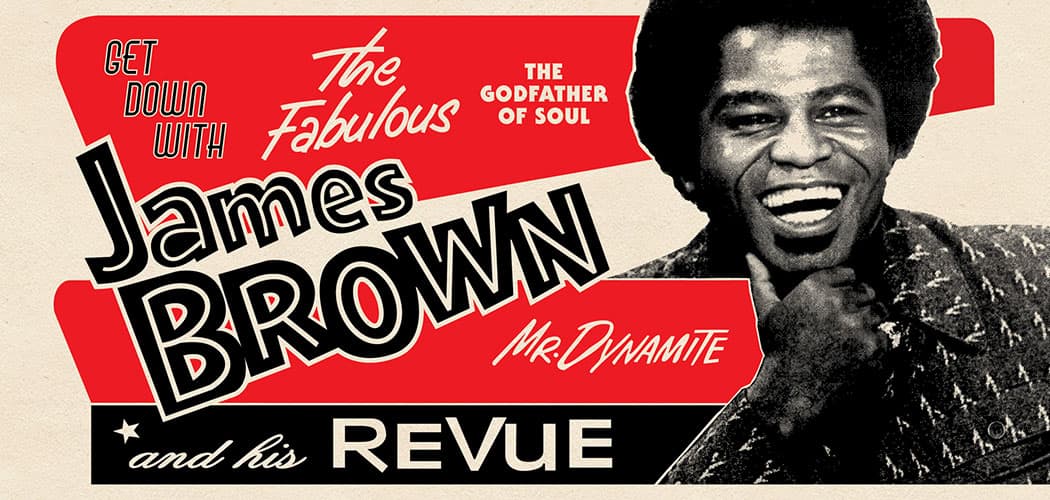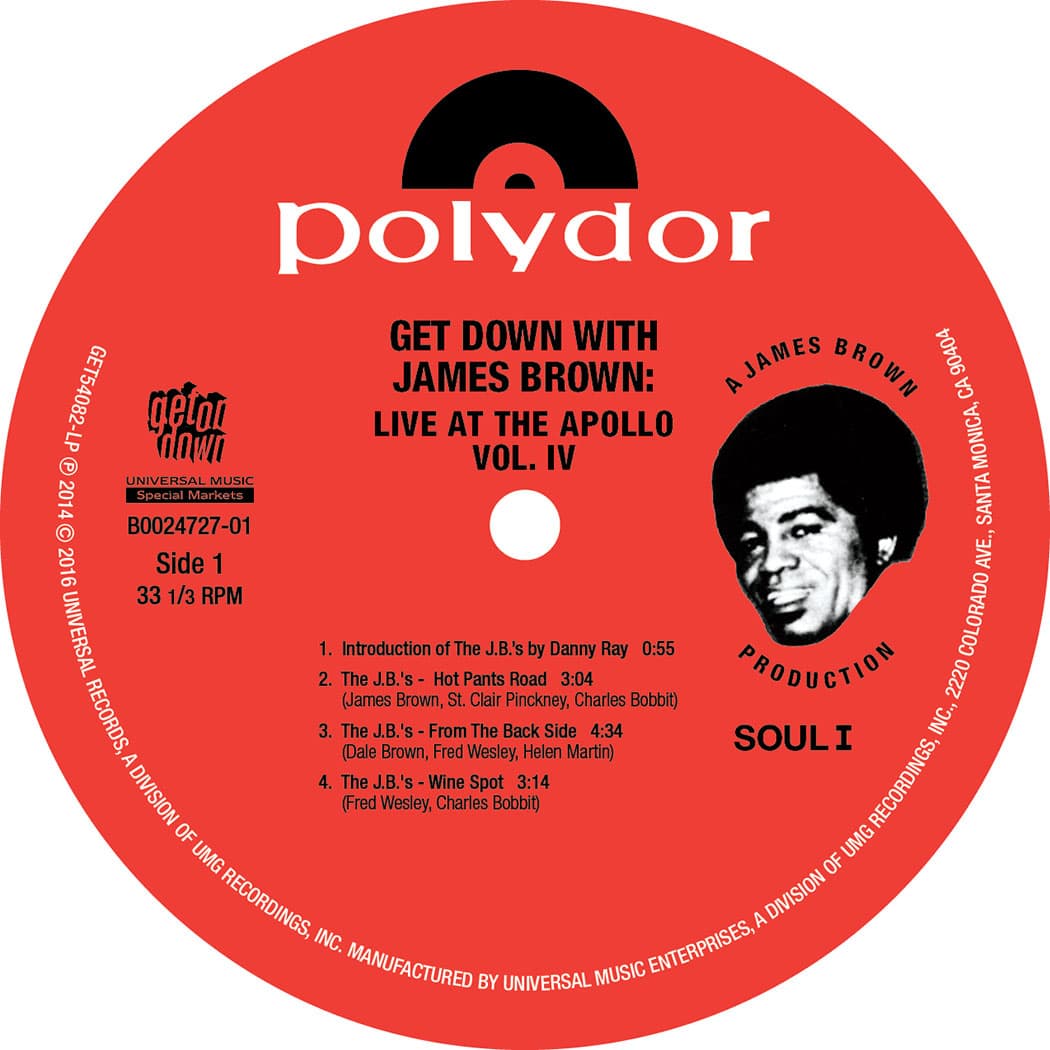Advertisement
Rare James Brown Live Recording Gets Vinyl Release From Malden Record Label

When James Brown makes his first appearance on “James Brown and His Revue: Live at the Apollo Vol. IV,” it’s to drop some wisdom. “We got to come up with some complaints against the black movies,” he says, while his band vamps coolly in the background. “They make you feel that every black woman is a prostitute, and every black man is a dope pusher.” The audience breaks into applause.
The moment is bracing; though Brown’s remarks were made in 1972, they could easily apply today, as a public debate around Hollywood’s dearth of diversity rages. Yet until recently, this particular snapshot of Brown -- defiant, eloquent and possessed of an easy conversational intimacy -- languished quietly in the Universal Music Group archives, a forgotten relic of a musical golden era and a nation struggling to heal from its raw racial wounds. A time, and a sound, long gone, yet astonishingly resonant even now.

Recorded at a 1972 concert at the Apollo Theater in Harlem, “Live at the Apollo Vol. IV” was eventually released, without much fanfare, as part of a digital box set in 2014. But only now is the album getting its moment in the sun — or, more accurately, on the shelves. On April 16, Record Store Day, the Malden music label and online boutique Get On Down will roll out the first vinyl LPs of “Live at the Apollo Vol. IV” at participating brick and mortar record stores around the world.
James McBride Says It Loud In New Book: The Proud But Tragic Story Of James Brown
Brown’s voice — that iconic rasp — doesn’t actually appear all that often on “James Brown and His Revue: Live at the Apollo Vol. IV.” The spotlight belongs to the Revue: Brown’s backup band, The J.B.’s, along with the singers Lyn Collins and Bobby Byrd, both artists on Brown and Byrd’s label People Records.
“We all know that some of [Brown’s] best songs aren't necessarily James Brown songs,” says Get On Down co-owner Matt Welch. “He had a sound, and he had a sound as a producer, and sometimes his greatest work, he was working with other people.”
Welch says that when he first listened to “Live at the Apollo Vol. IV,” he was surprised that the album had been shelved. “It surpassed my expectations,” he says, adding that, with the recent founding of People Records in 1971, “Live at the Apollo Vol. IV” was probably designed to leverage Brown’s name in order to bring attention to the artists on his label. Maybe, Welch speculates, Brown was unhappy with the product — he was notoriously perfectionistic — or perhaps he was simply too busy. But the reason Polydor Records, or its parent company Universal Music Group, chose to abandon “Live at the Apollo Vol. IV” can only be guessed at now.
At the time that “Live at the Apollo IV” was recorded, Brown’s band was operating at its peak. “They were probably professionally recognized as the greatest touring band in the world,” says Welch. And indeed, the songs on “Live at the Apollo IV” are slick and impressive. Highlights include a loose, slinky rendition of “From The Back Side” by The J.B.’s, a breathless “There It Is” helmed by Brown, and a powerful performance of “Think (About It)” by Lyn Collins in which she orders all the women in the audience to their feet before she addresses the men: “From now on, you’re going to have to give us what we want, when we want it, how we want it, and as much as we want!”

Founded in 2008 as an imprint of the music and video distribution company Traffic Entertainment, Get On Down made its name with whimsically-packaged deluxe reissues of rap albums: a remastered “Liquid Swords” by Genius/GZA accompanied by a miniature carved wooden chess set; an illustrated lunch box containing “Operation: Doomsday” by MF Doom; a box set of Ol’ Dirty Bastard’s debut solo album paired with a reproduction of the rapper’s food stamp card, which was featured on the cover of the original. Appropriately, the album art for “James Brown and His Revue: Live at the Apollo Vol. IV” was studiously inspired by posters from James Brown concerts of that era, its fonts painstakingly recreated and jauntily displayed next to a vintage photograph of the man himself.
In recent years Traffic and Get On Down have benefited from the resurgence of vinyl. The Traffic Entertainment warehouse, tucked away on a side street in a drab commercial corner of Malden, a northern suburb of Boston, is a mecca for the high-fidelity-obsessed. An enormous second floor office with exposed brick walls doubles as extra storage space, with desks crammed between oversized boxes on dollies and teetering stacks of LPs. You have to look carefully to spot the company’s handful of employees, who have been rendered miniscule by an overwhelming quantity of slim, unassuming cardboard squares.
Seated at a long conference table in the Traffic offices, Welch and Get On Down operations manager George Andrinopoulos (also known as DJ 7L and one third of underground rap outfit Czarface) reminisce about boyhoods consumed by the hunt for musical product: riding the train from the suburbs to visit Tower Records on Newbury Street, bussing down to Manhattan to pilfer the city’s vast repositories of LPs. They also recall how much more difficult and intimidating it was to learn anything about music during the pre-Internet era. Remember the snide, ponytailed Comic Book Guy from “The Simpsons”? “That’s every record collector,” says Andrinopoulos.
“Every store had that guy,” adds Welch. “You don't want to ask any questions, you don't want to not know something you're supposed to know. It was so painful."
Now, thanks to the Internet, the gatekeepers have diminished, receding into the dark basement corners whence they came. But Welch and Andrinopoulos look wistfully back on a time when, with all the legwork it took just to lay hands on a record — let alone the effort required to learn which albums were even worth buying — music felt more precious.
“The thing with records is, putting it on — and I guess this is going to sound romanticized a little bit — but putting it on and then kicking back and reading the back of the record, you're more involved in what's going on than if you've just got something playing on iTunes and you're clicking around on your computer,” says Andrinopoulos. “When I'm playing a record, there's stuff you got to do with it. Put the needle back, flip sides, read the record. There's more to it."
Because Record Store Day is such an affair — more than 1,000 outlets now participate in an event conceived in 2007 to bring attention to the world’s few remaining independently-owned record shops — Welch hopes that more than just diehard James Brown fanatics will discover “James Brown and His Revue: Live at the Apollo Vol. IV.”
“It's crazy enough to say it, but a 22-year-old kid might walk in,” says Welch. “And that might be their first James Brown record.”


